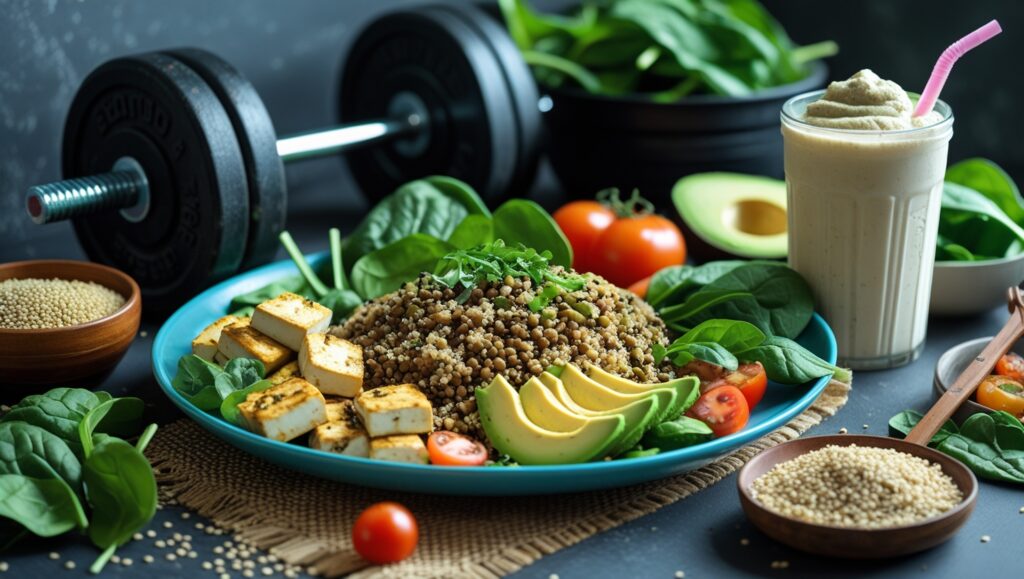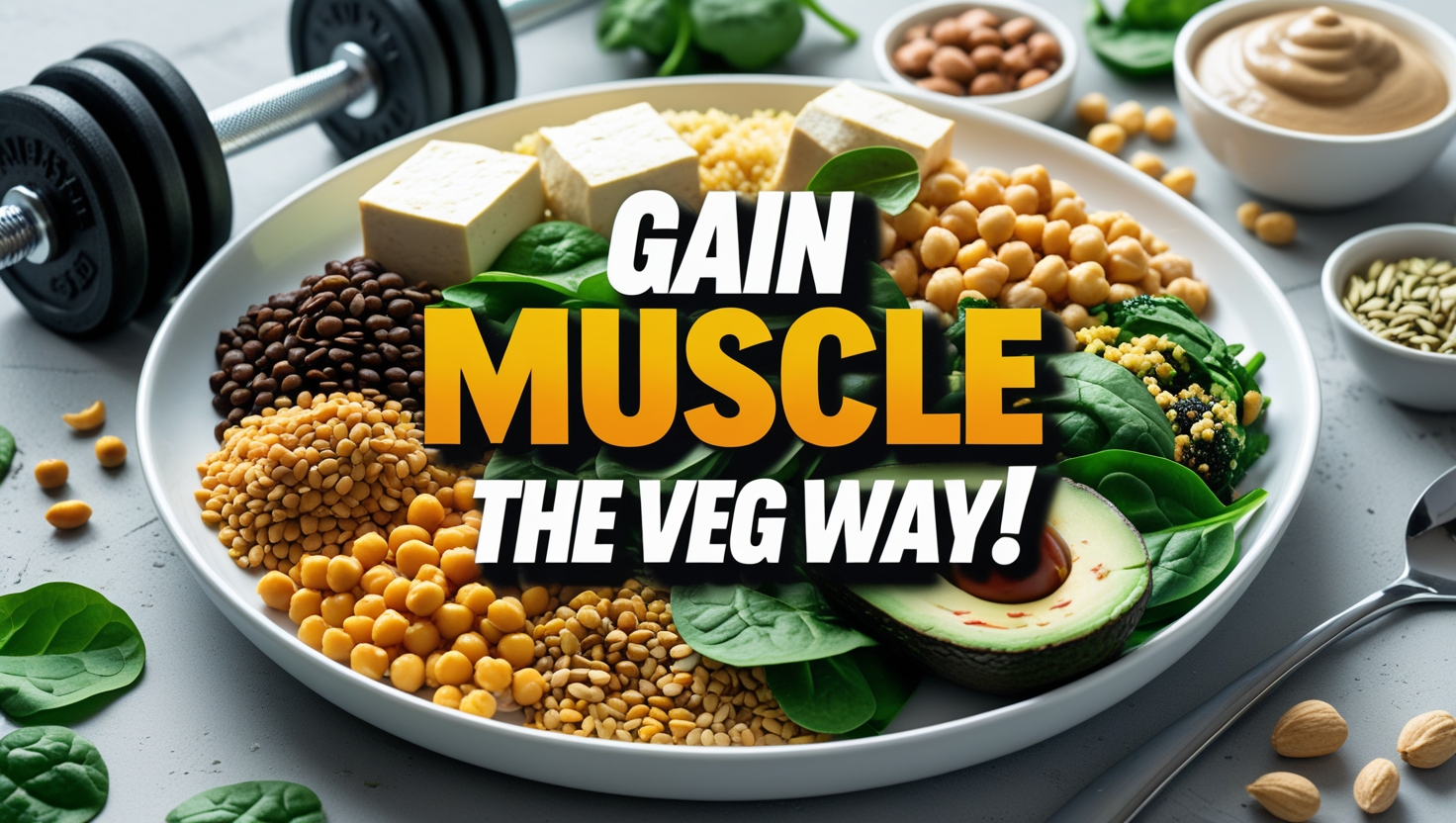Are you a vegetarian struggling to gain muscle? Think muscle building is only for meat-eaters? Think again. At Healtholia, we bring you the ultimate muscle gain veg diet plan that is not only 100% vegetarian, but also scientifically designed to help you build lean muscle mass, improve strength, and stay fit—without compromising your ethics or lifestyle.
In this comprehensive guide, you’ll discover:
- Understanding How Muscle Grows on a Vegetarian Diet
- The best high-protein vegetarian foods
- A detailed 7-day veg muscle gain diet plan
- Pre and post-workout meal ideas
- Pro tips to boost your muscle-building journey
Let’s take a closer look at how vegetarians can fuel muscle gain through smart nutrition..
Why Muscle Gain Is Possible on a Vegetarian Diet
You can build strong, lean muscles without ever touching meat. Muscle growth depends on:
- Adequate caloric intake
- Sufficient protein consumption
- Resistance training
- Proper rest and recovery
A well-planned vegetarian muscle gain diet can provide all essential nutrients required to stimulate muscle protein synthesis, boost recovery, and enhance strength.
Key Nutrients for Muscle Building:
- Protein – Builds and repairs muscle tissue
- Carbohydrates – Fuels workouts and replenishes energy
- Healthy Fats – Supports hormones and cell function
- Vitamins & Minerals – Vital for performance and recovery
High-Protein Vegetarian Foods for Muscle Gain
Here are the top vegetarian protein sources you must include in your diet:
| Food Item | Protein per 100g |
|---|---|
| Paneer (Cottage Cheese) | 18g |
| Tofu & Tempeh | 12–20g |
| Lentils (Masoor, Moong, etc.) | 9g |
| Chickpeas & Kidney Beans | 8–9g |
| Soybeans (Boiled) | 16g |
| Quinoa | 14g |
| Greek Yogurt (Low-Fat) | 10g |
| Milk | 3.4g |
| Nuts & Seeds (Almonds, Chia, Flax) | 15–20g |
| Protein Powders (Plant-based) | 20–25g per scoop |
Muscle Gain Veg Diet Plan: Daily Macros
To gain muscle, you need to consume:
- Calories: 15–20% above your maintenance level
- Protein: 1.6 to 2.2 grams per kg of body weight
- Carbs: 4–6 grams per kg of body weight
- Fats: 0.8 to 1 gram per kg of body weight
Example: If you weigh 70 kg, you should aim for:
- Protein: 112–154g/day
- Carbs: 280–420g/day
- Fats: 56–70g/day
7-Day Vegetarian Muscle Gain Meal Plan
Here’s a complete 7-day muscle gain veg diet plan with calorie and protein estimates:
Day 1:
Breakfast:
- Oats with milk, banana, peanut butter, and chia seeds
- 2 boiled eggs (if ovo-vegetarian)
Protein: 25g | Calories: 500
Mid-Morning Snack:
- Greek yogurt with almonds
Protein: 15g | Calories: 250
Lunch:
- Brown rice, rajma (kidney beans), salad, curd
Protein: 30g | Calories: 700
Pre-Workout Snack:
- Banana + black coffee
Protein: 1g | Calories: 120
Post-Workout:
- Plant protein shake (1 scoop) + dates
Protein: 25g | Calories: 250
Dinner:
- Whole wheat roti, tofu bhurji, steamed veggies
Protein: 30g | Calories: 600
Total Protein: 126g | Calories: 2420

Day 2 to Day 7:
The remaining six days will follow a similar macronutrient structure with different meals to avoid boredom and cover a variety of nutrients.
Examples include:
- Upma with soya chunks
- Quinoa pulao with mixed vegetables
- Tofu wraps with hummus
- Protein pancakes with oats and Greek yogurt
- Moong dal chilla with paneer filling
- Sprouts salad with olive oil and lemon
Let me know if you’d like the full meal plan charted in a table format.
Muscle Gain Smoothies (Vegetarian-Friendly)
Boost your calories and protein intake with homemade smoothies:
1. Peanut Butter Banana Protein Shake
- Milk (250ml)
- Banana (1)
- Peanut butter (1 tbsp)
- Oats (2 tbsp)
- Protein powder (1 scoop)
Protein: ~30g | Calories: ~450
2. Green Muscle Smoothie
- Spinach
- Greek yogurt
- Pineapple
- Chia seeds
- Almond milk
Protein: ~20g | Calories: ~300
Pre- and Post-Workout Meals (Veg Muscle Gain)
Pre-Workout (30–60 min before gym):
- Banana + coffee
- Oats + fruit
- Whole wheat bread + peanut butter
Post-Workout:
- Plant protein shake + banana
- Tofu or paneer sandwich
- Sprout salad + fruit smoothie
Post-workout meals should be rich in protein and simple carbs to aid in muscle recovery and glycogen replenishment.
Supplements for Muscle Gain (Vegetarian)
While whole foods are best, here are vegetarian-friendly supplements to consider:
- Plant-Based Protein Powder (Pea, Rice, Soy)
- Creatine Monohydrate (synthetic, usually vegan-friendly)
- B12 Supplement – Essential for vegetarians
- Vitamin D3 – Often lacking in veg diets
- Omega-3 (from algae oil)
Always consult a healthcare provider before adding supplements.
Common Mistakes in Veg Muscle Gain Diet
Avoid these pitfalls:
Not eating enough calories
Relying too much on carbs
Not tracking protein intake
Lack of strength training
Skipping meals or poor meal timing
Workout Tips for Muscle Gain
- Train 4–5 days a week: Focus on compound exercises (squats, deadlifts, bench press)
- Progressive overload: Increase weights gradually
- Rest: Get 7–8 hours of sleep for optimal recovery
- Stay hydrated: Drink 3–4 liters of water daily
Muscle gain is 70% diet and 30% training—don’t underestimate either.
FAQs: Vegetarian Muscle Gain Veg Diet
Q1. Can I gain muscle without eating meat or eggs?
Yes! With proper planning, a vegetarian diet can meet all protein and calorie needs.
Q2. Which vegetarian food is highest in protein?
Soya chunks, tofu, lentils, and paneer are among the highest.
Q3.How much protein do I need daily for muscle gain?
For muscle gain, aim for 1.6 to 2.2 grams of protein per kilogram of body weight per day, depending on your activity level..
Q4. How many meals a day should I eat?
Aim for 5–6 small meals to keep a steady flow of nutrients and calories.
Conclusion: Build Muscle the Veg Way!
Gaining muscle on a vegetarian diet is absolutely achievable with the right nutrition, workout, and mindset. Focus on balanced meals, high protein foods, and consistent training. Follow the above muscle gain veg diet plan tailored by Healtholia, and you’ll be well on your way to a stronger, healthier body—ethically and effectively.




